Analyzing Theories of Leadership: Authentic Leadership and Ethics
VerifiedAdded on 2023/06/04
|12
|2887
|453
Essay
AI Summary
This essay explores the concept of authentic leadership, highlighting its importance in modern organizations. It discusses various leadership theories, focusing on authentic leadership as a means of establishing trust, respect, and ethical conduct within an organization. The essay details the components of authentic leadership, including self-awareness, relational transparency, balanced processing, and internalized moral perspective. It further examines how authentic leaders influence their followers through relayed knowledge, communicative enthusiasm, and the promotion of independence. Additionally, the essay evaluates organizational practices that facilitate an ethical work environment, emphasizing the role of leaders in setting ethical standards and creating a culture of accountability. The use of ethics codes, fair resource allocation, and comprehensive training programs are also discussed as methods to instill ethical behavior within an organization. The essay concludes by highlighting the importance of role modeling and aligned actions in fostering a virtuous and ethical organizational culture.
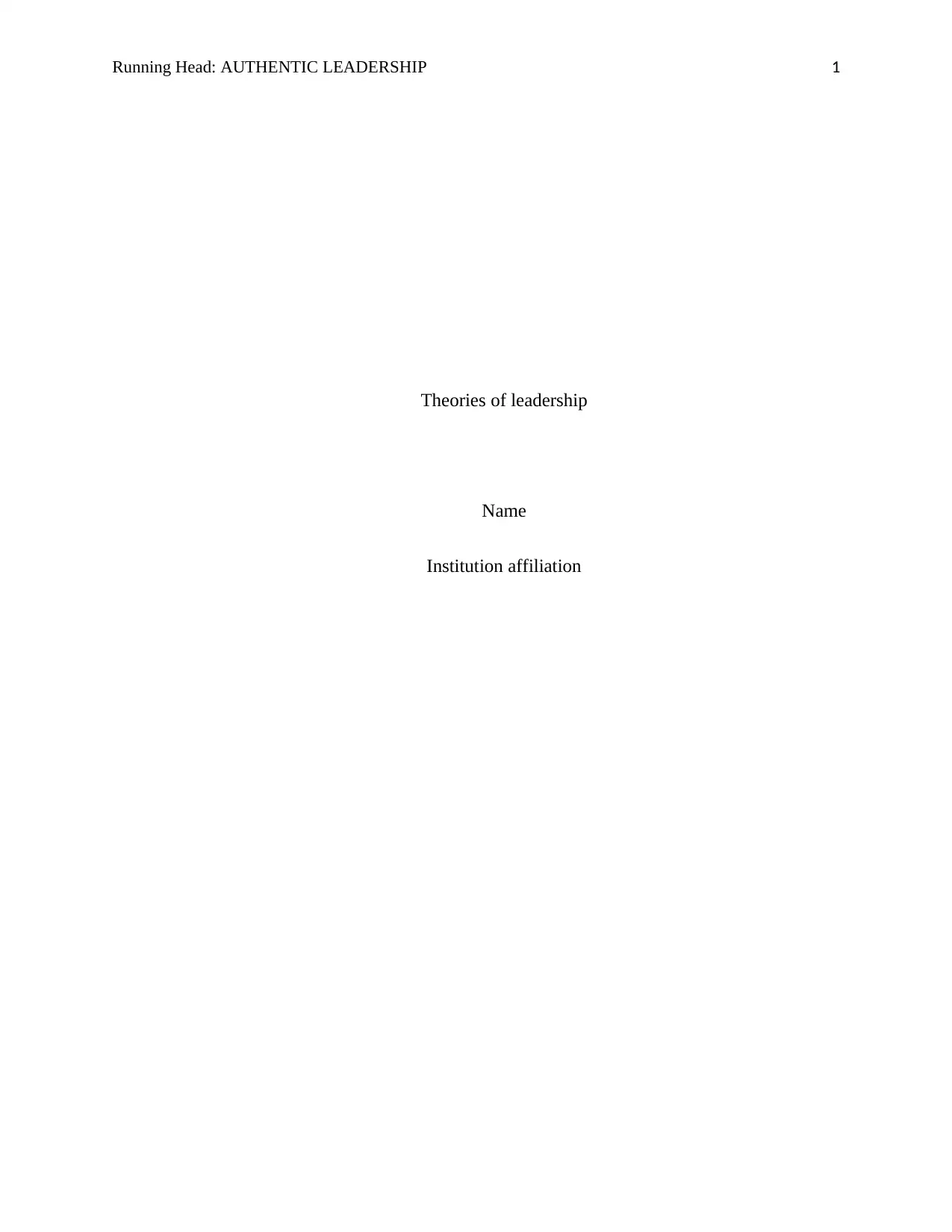
Running Head: AUTHENTIC LEADERSHIP 1
Theories of leadership
Name
Institution affiliation
Theories of leadership
Name
Institution affiliation
Paraphrase This Document
Need a fresh take? Get an instant paraphrase of this document with our AI Paraphraser

THEORIES OF LEADERSHIP 2
Leadership
Leadership
Leadership plays a vital task in generating worth, improvement and establishing approaches of
administration and enactment of information. Also, leadership tends to impacts on the function
of surrounding issues of how collaboration happens between employees in the know-how
exchange, in the designation of intra and inter-organization duties as well as competence.
Additionally, leadership is extensively seen as having a significant role in nurturing ethical
conduct in an institute (Northouse,2018). There exist various theories and leadership classes
which are grounded on some conventions about how front-runners ought to act and what is their
part within the corporate. Based on this context, the subject on the establishment's governance
style or leadership design embraced by the leader some actions and behaviors are prompted that
either impact positively or negatively to the organization.
Authentic leadership
Numerous high-profile corporate scandals have initiated to the rise of the conception of
legitimate governance. According to Northouse, (2018) authentic leaders ought to act following
low individual standards and principles to establish reliability and win respect and trust of fans.
Authentic leadership is thus considered as the replication of the ethics and principles of both the
leader and organization. Also, a valid application of authentic leadership exclusively depends on
the ethics and benefits of the leader.
Additionally, this type of leadership should not be falsified and ought to be clear since a follower
will detect via any misrepresentation and thus lose conviction and admiration for the leader. The
Leadership
Leadership
Leadership plays a vital task in generating worth, improvement and establishing approaches of
administration and enactment of information. Also, leadership tends to impacts on the function
of surrounding issues of how collaboration happens between employees in the know-how
exchange, in the designation of intra and inter-organization duties as well as competence.
Additionally, leadership is extensively seen as having a significant role in nurturing ethical
conduct in an institute (Northouse,2018). There exist various theories and leadership classes
which are grounded on some conventions about how front-runners ought to act and what is their
part within the corporate. Based on this context, the subject on the establishment's governance
style or leadership design embraced by the leader some actions and behaviors are prompted that
either impact positively or negatively to the organization.
Authentic leadership
Numerous high-profile corporate scandals have initiated to the rise of the conception of
legitimate governance. According to Northouse, (2018) authentic leaders ought to act following
low individual standards and principles to establish reliability and win respect and trust of fans.
Authentic leadership is thus considered as the replication of the ethics and principles of both the
leader and organization. Also, a valid application of authentic leadership exclusively depends on
the ethics and benefits of the leader.
Additionally, this type of leadership should not be falsified and ought to be clear since a follower
will detect via any misrepresentation and thus lose conviction and admiration for the leader. The

THEORIES OF LEADERSHIP 3
focus of authentic leadership is a reinforcement of followers rather than an emphasis on failures
and shortcomings an admirer provides to the leader and the corporation as a whole.
According to Eisenbeiss, Silken, and Felix (2014) authentic leadership is defined as a procedure
which encompasses from both positive mental abilities and a highly developed corporate setting,
that end in both greater self-discovery and self-controlled positive actions on the part of leaders
and associates, nurturing positive self-development.
Components of authentic leadership
According to Allio (2012), authentic leadership encompasses four significant elements; self-
awareness, relational transparency, balanced processing, and internalized moral perspective.
Self-awareness entails consideration of one's abilities such as strengths and weaknesses and the
multi-faceted nature of self.
Balanced processing refers to a leader objectively investigating all applicable material before
making any judgment that includes cheering the rest to inquiry and test individual's principles
Relational transparency entails being true to one's beliefs and articulating this to other people.
Indeed it consists of the open partaking of evidence about an individual's thought and moods.
Internalized moral perspective recalls to self-regulation which is established on internalized
ethical standards in contrast to those imposed by an organization. In most instances, they are
conveyed in ethical resolution making and moral behavior.
Formerly, the authentic leadership was known as a procedure which endorses constructive
emotional capabilities and a highly advanced administrative framework, leading in greater self-
focus of authentic leadership is a reinforcement of followers rather than an emphasis on failures
and shortcomings an admirer provides to the leader and the corporation as a whole.
According to Eisenbeiss, Silken, and Felix (2014) authentic leadership is defined as a procedure
which encompasses from both positive mental abilities and a highly developed corporate setting,
that end in both greater self-discovery and self-controlled positive actions on the part of leaders
and associates, nurturing positive self-development.
Components of authentic leadership
According to Allio (2012), authentic leadership encompasses four significant elements; self-
awareness, relational transparency, balanced processing, and internalized moral perspective.
Self-awareness entails consideration of one's abilities such as strengths and weaknesses and the
multi-faceted nature of self.
Balanced processing refers to a leader objectively investigating all applicable material before
making any judgment that includes cheering the rest to inquiry and test individual's principles
Relational transparency entails being true to one's beliefs and articulating this to other people.
Indeed it consists of the open partaking of evidence about an individual's thought and moods.
Internalized moral perspective recalls to self-regulation which is established on internalized
ethical standards in contrast to those imposed by an organization. In most instances, they are
conveyed in ethical resolution making and moral behavior.
Formerly, the authentic leadership was known as a procedure which endorses constructive
emotional capabilities and a highly advanced administrative framework, leading in greater self-
⊘ This is a preview!⊘
Do you want full access?
Subscribe today to unlock all pages.

Trusted by 1+ million students worldwide
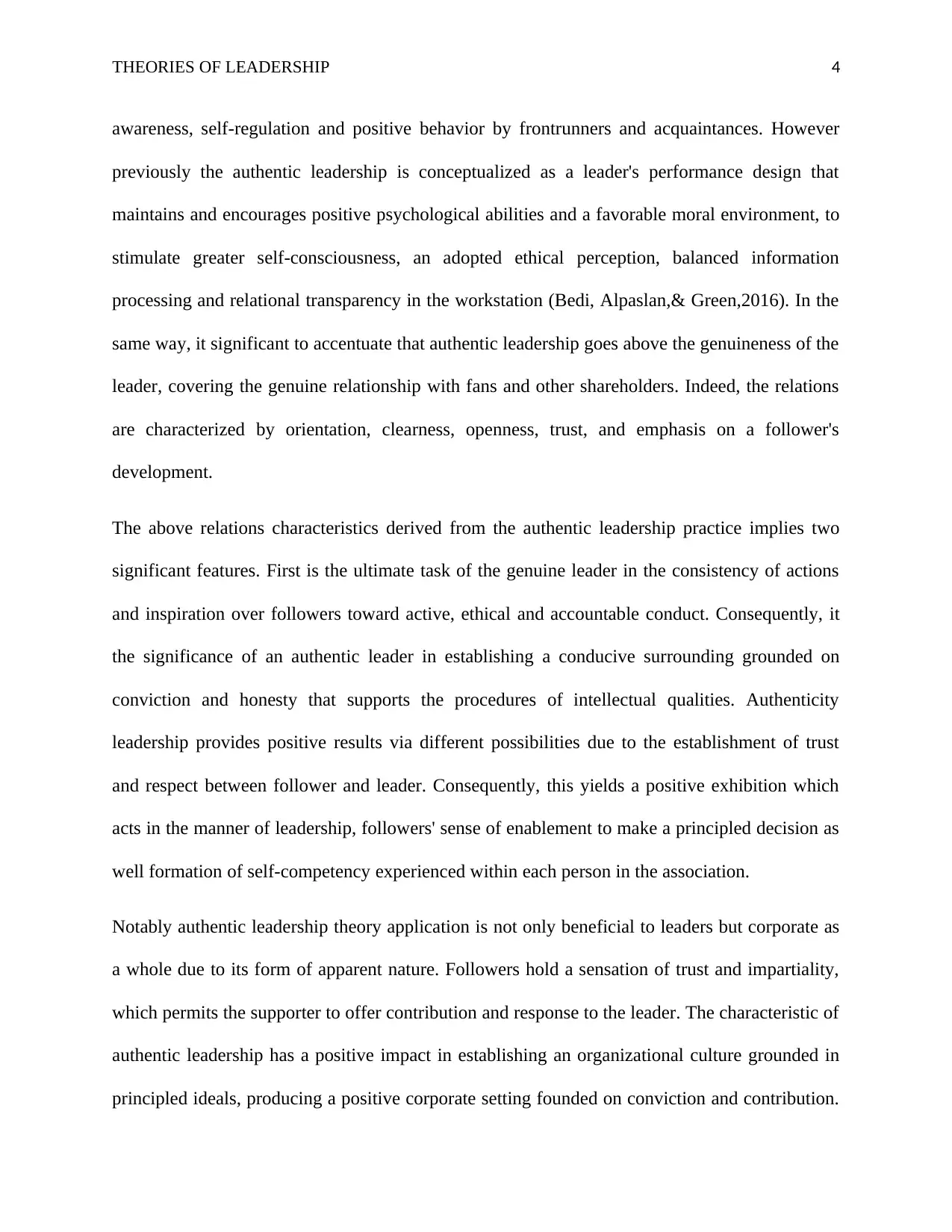
THEORIES OF LEADERSHIP 4
awareness, self-regulation and positive behavior by frontrunners and acquaintances. However
previously the authentic leadership is conceptualized as a leader's performance design that
maintains and encourages positive psychological abilities and a favorable moral environment, to
stimulate greater self-consciousness, an adopted ethical perception, balanced information
processing and relational transparency in the workstation (Bedi, Alpaslan,& Green,2016). In the
same way, it significant to accentuate that authentic leadership goes above the genuineness of the
leader, covering the genuine relationship with fans and other shareholders. Indeed, the relations
are characterized by orientation, clearness, openness, trust, and emphasis on a follower's
development.
The above relations characteristics derived from the authentic leadership practice implies two
significant features. First is the ultimate task of the genuine leader in the consistency of actions
and inspiration over followers toward active, ethical and accountable conduct. Consequently, it
the significance of an authentic leader in establishing a conducive surrounding grounded on
conviction and honesty that supports the procedures of intellectual qualities. Authenticity
leadership provides positive results via different possibilities due to the establishment of trust
and respect between follower and leader. Consequently, this yields a positive exhibition which
acts in the manner of leadership, followers' sense of enablement to make a principled decision as
well formation of self-competency experienced within each person in the association.
Notably authentic leadership theory application is not only beneficial to leaders but corporate as
a whole due to its form of apparent nature. Followers hold a sensation of trust and impartiality,
which permits the supporter to offer contribution and response to the leader. The characteristic of
authentic leadership has a positive impact in establishing an organizational culture grounded in
principled ideals, producing a positive corporate setting founded on conviction and contribution.
awareness, self-regulation and positive behavior by frontrunners and acquaintances. However
previously the authentic leadership is conceptualized as a leader's performance design that
maintains and encourages positive psychological abilities and a favorable moral environment, to
stimulate greater self-consciousness, an adopted ethical perception, balanced information
processing and relational transparency in the workstation (Bedi, Alpaslan,& Green,2016). In the
same way, it significant to accentuate that authentic leadership goes above the genuineness of the
leader, covering the genuine relationship with fans and other shareholders. Indeed, the relations
are characterized by orientation, clearness, openness, trust, and emphasis on a follower's
development.
The above relations characteristics derived from the authentic leadership practice implies two
significant features. First is the ultimate task of the genuine leader in the consistency of actions
and inspiration over followers toward active, ethical and accountable conduct. Consequently, it
the significance of an authentic leader in establishing a conducive surrounding grounded on
conviction and honesty that supports the procedures of intellectual qualities. Authenticity
leadership provides positive results via different possibilities due to the establishment of trust
and respect between follower and leader. Consequently, this yields a positive exhibition which
acts in the manner of leadership, followers' sense of enablement to make a principled decision as
well formation of self-competency experienced within each person in the association.
Notably authentic leadership theory application is not only beneficial to leaders but corporate as
a whole due to its form of apparent nature. Followers hold a sensation of trust and impartiality,
which permits the supporter to offer contribution and response to the leader. The characteristic of
authentic leadership has a positive impact in establishing an organizational culture grounded in
principled ideals, producing a positive corporate setting founded on conviction and contribution.
Paraphrase This Document
Need a fresh take? Get an instant paraphrase of this document with our AI Paraphraser
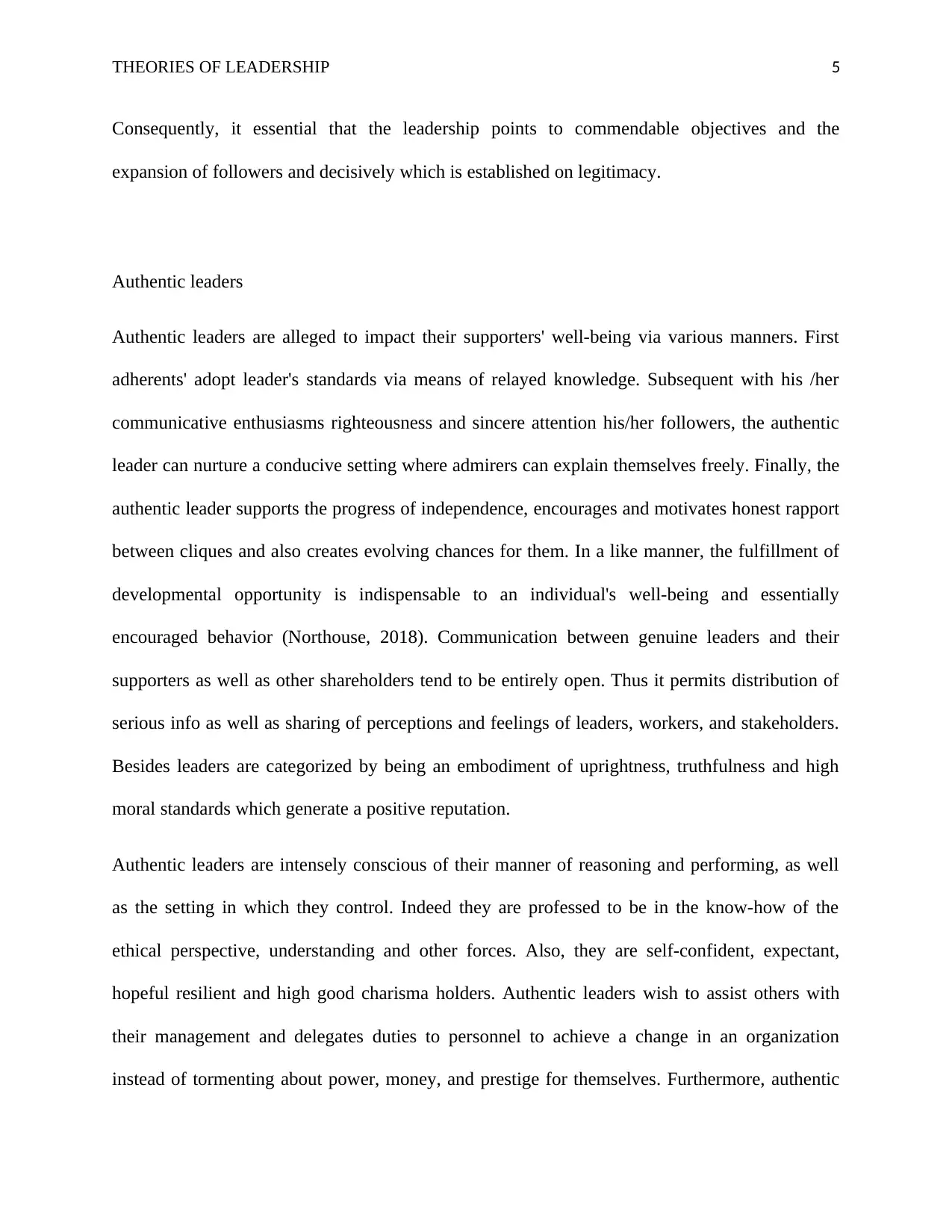
THEORIES OF LEADERSHIP 5
Consequently, it essential that the leadership points to commendable objectives and the
expansion of followers and decisively which is established on legitimacy.
Authentic leaders
Authentic leaders are alleged to impact their supporters' well-being via various manners. First
adherents' adopt leader's standards via means of relayed knowledge. Subsequent with his /her
communicative enthusiasms righteousness and sincere attention his/her followers, the authentic
leader can nurture a conducive setting where admirers can explain themselves freely. Finally, the
authentic leader supports the progress of independence, encourages and motivates honest rapport
between cliques and also creates evolving chances for them. In a like manner, the fulfillment of
developmental opportunity is indispensable to an individual's well-being and essentially
encouraged behavior (Northouse, 2018). Communication between genuine leaders and their
supporters as well as other shareholders tend to be entirely open. Thus it permits distribution of
serious info as well as sharing of perceptions and feelings of leaders, workers, and stakeholders.
Besides leaders are categorized by being an embodiment of uprightness, truthfulness and high
moral standards which generate a positive reputation.
Authentic leaders are intensely conscious of their manner of reasoning and performing, as well
as the setting in which they control. Indeed they are professed to be in the know-how of the
ethical perspective, understanding and other forces. Also, they are self-confident, expectant,
hopeful resilient and high good charisma holders. Authentic leaders wish to assist others with
their management and delegates duties to personnel to achieve a change in an organization
instead of tormenting about power, money, and prestige for themselves. Furthermore, authentic
Consequently, it essential that the leadership points to commendable objectives and the
expansion of followers and decisively which is established on legitimacy.
Authentic leaders
Authentic leaders are alleged to impact their supporters' well-being via various manners. First
adherents' adopt leader's standards via means of relayed knowledge. Subsequent with his /her
communicative enthusiasms righteousness and sincere attention his/her followers, the authentic
leader can nurture a conducive setting where admirers can explain themselves freely. Finally, the
authentic leader supports the progress of independence, encourages and motivates honest rapport
between cliques and also creates evolving chances for them. In a like manner, the fulfillment of
developmental opportunity is indispensable to an individual's well-being and essentially
encouraged behavior (Northouse, 2018). Communication between genuine leaders and their
supporters as well as other shareholders tend to be entirely open. Thus it permits distribution of
serious info as well as sharing of perceptions and feelings of leaders, workers, and stakeholders.
Besides leaders are categorized by being an embodiment of uprightness, truthfulness and high
moral standards which generate a positive reputation.
Authentic leaders are intensely conscious of their manner of reasoning and performing, as well
as the setting in which they control. Indeed they are professed to be in the know-how of the
ethical perspective, understanding and other forces. Also, they are self-confident, expectant,
hopeful resilient and high good charisma holders. Authentic leaders wish to assist others with
their management and delegates duties to personnel to achieve a change in an organization
instead of tormenting about power, money, and prestige for themselves. Furthermore, authentic
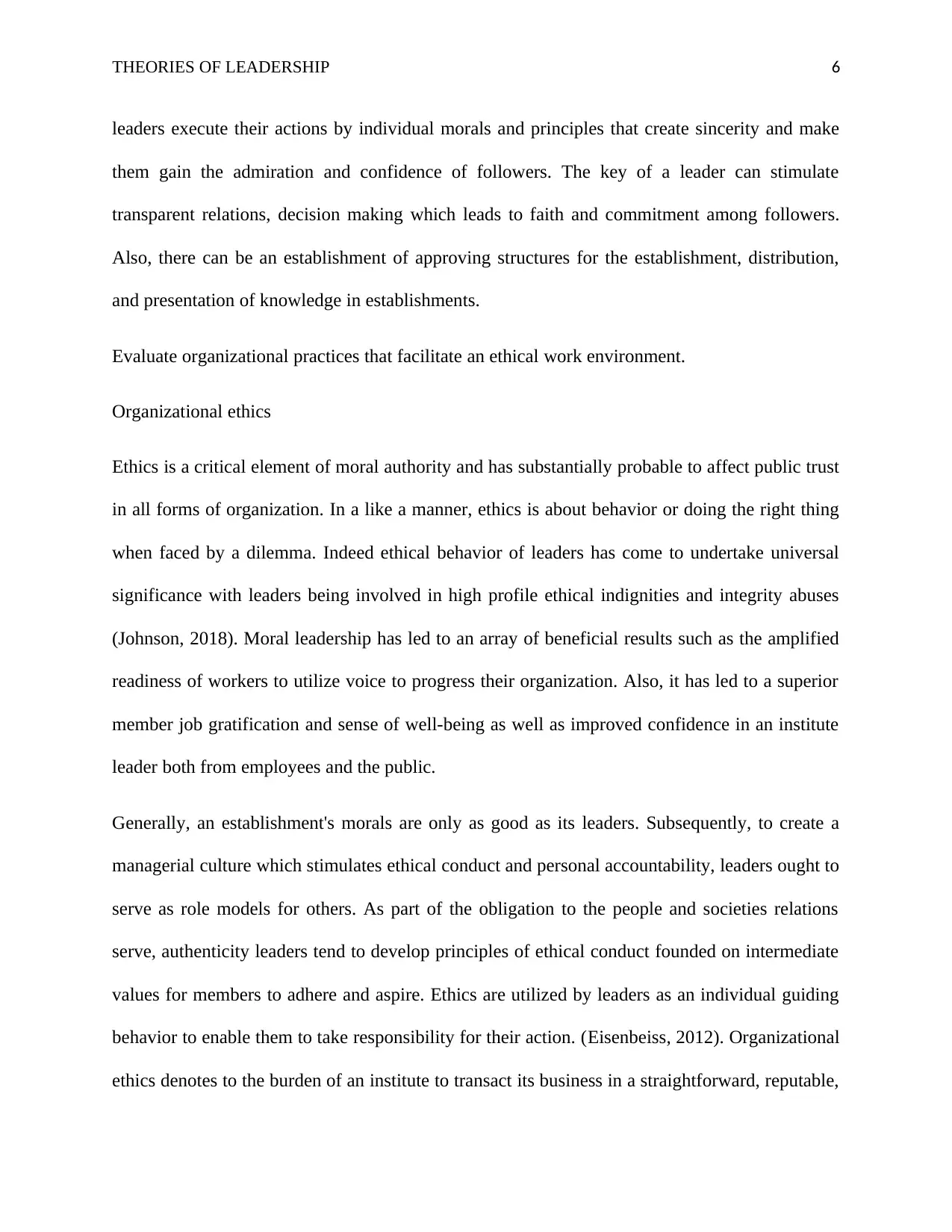
THEORIES OF LEADERSHIP 6
leaders execute their actions by individual morals and principles that create sincerity and make
them gain the admiration and confidence of followers. The key of a leader can stimulate
transparent relations, decision making which leads to faith and commitment among followers.
Also, there can be an establishment of approving structures for the establishment, distribution,
and presentation of knowledge in establishments.
Evaluate organizational practices that facilitate an ethical work environment.
Organizational ethics
Ethics is a critical element of moral authority and has substantially probable to affect public trust
in all forms of organization. In a like a manner, ethics is about behavior or doing the right thing
when faced by a dilemma. Indeed ethical behavior of leaders has come to undertake universal
significance with leaders being involved in high profile ethical indignities and integrity abuses
(Johnson, 2018). Moral leadership has led to an array of beneficial results such as the amplified
readiness of workers to utilize voice to progress their organization. Also, it has led to a superior
member job gratification and sense of well-being as well as improved confidence in an institute
leader both from employees and the public.
Generally, an establishment's morals are only as good as its leaders. Subsequently, to create a
managerial culture which stimulates ethical conduct and personal accountability, leaders ought to
serve as role models for others. As part of the obligation to the people and societies relations
serve, authenticity leaders tend to develop principles of ethical conduct founded on intermediate
values for members to adhere and aspire. Ethics are utilized by leaders as an individual guiding
behavior to enable them to take responsibility for their action. (Eisenbeiss, 2012). Organizational
ethics denotes to the burden of an institute to transact its business in a straightforward, reputable,
leaders execute their actions by individual morals and principles that create sincerity and make
them gain the admiration and confidence of followers. The key of a leader can stimulate
transparent relations, decision making which leads to faith and commitment among followers.
Also, there can be an establishment of approving structures for the establishment, distribution,
and presentation of knowledge in establishments.
Evaluate organizational practices that facilitate an ethical work environment.
Organizational ethics
Ethics is a critical element of moral authority and has substantially probable to affect public trust
in all forms of organization. In a like a manner, ethics is about behavior or doing the right thing
when faced by a dilemma. Indeed ethical behavior of leaders has come to undertake universal
significance with leaders being involved in high profile ethical indignities and integrity abuses
(Johnson, 2018). Moral leadership has led to an array of beneficial results such as the amplified
readiness of workers to utilize voice to progress their organization. Also, it has led to a superior
member job gratification and sense of well-being as well as improved confidence in an institute
leader both from employees and the public.
Generally, an establishment's morals are only as good as its leaders. Subsequently, to create a
managerial culture which stimulates ethical conduct and personal accountability, leaders ought to
serve as role models for others. As part of the obligation to the people and societies relations
serve, authenticity leaders tend to develop principles of ethical conduct founded on intermediate
values for members to adhere and aspire. Ethics are utilized by leaders as an individual guiding
behavior to enable them to take responsibility for their action. (Eisenbeiss, 2012). Organizational
ethics denotes to the burden of an institute to transact its business in a straightforward, reputable,
⊘ This is a preview!⊘
Do you want full access?
Subscribe today to unlock all pages.

Trusted by 1+ million students worldwide
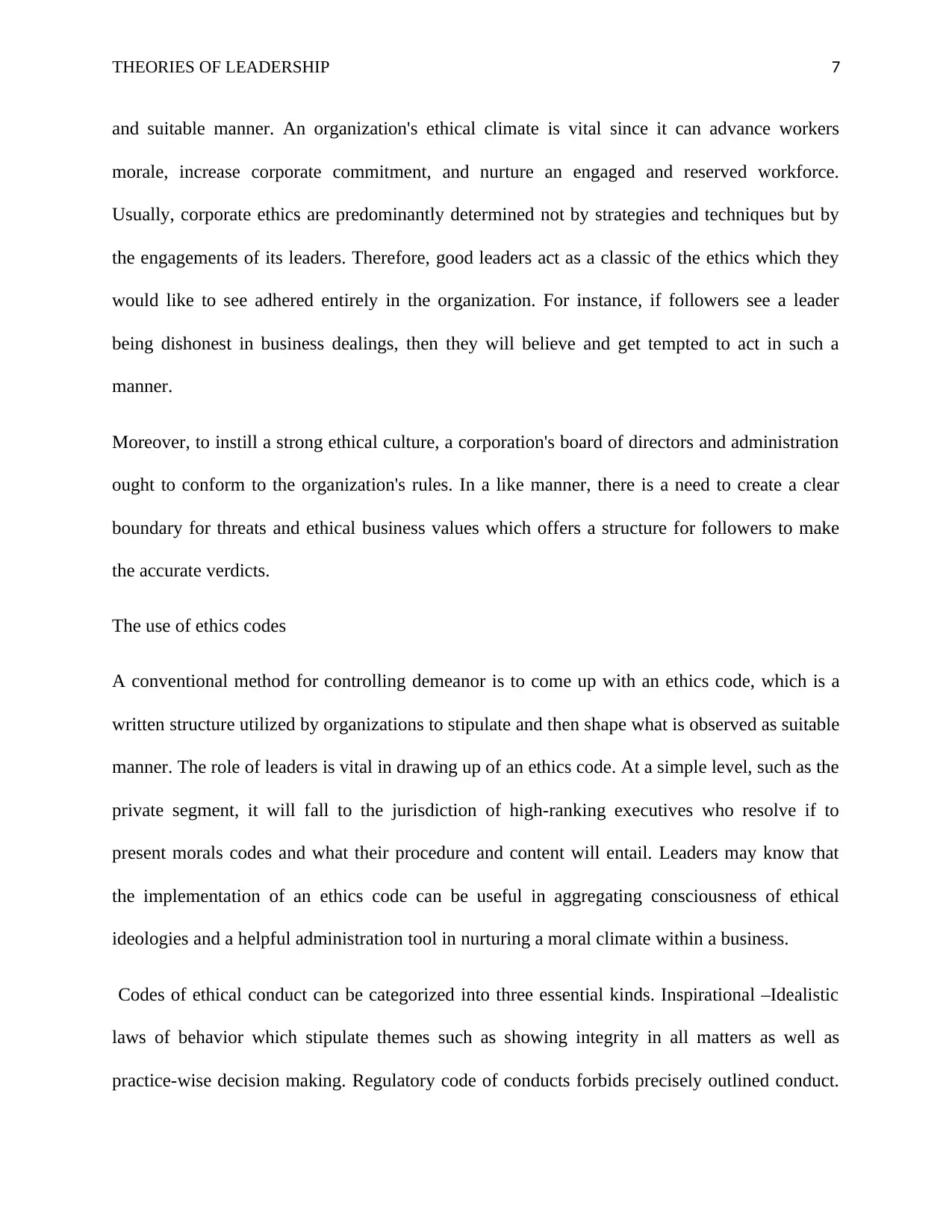
THEORIES OF LEADERSHIP 7
and suitable manner. An organization's ethical climate is vital since it can advance workers
morale, increase corporate commitment, and nurture an engaged and reserved workforce.
Usually, corporate ethics are predominantly determined not by strategies and techniques but by
the engagements of its leaders. Therefore, good leaders act as a classic of the ethics which they
would like to see adhered entirely in the organization. For instance, if followers see a leader
being dishonest in business dealings, then they will believe and get tempted to act in such a
manner.
Moreover, to instill a strong ethical culture, a corporation's board of directors and administration
ought to conform to the organization's rules. In a like manner, there is a need to create a clear
boundary for threats and ethical business values which offers a structure for followers to make
the accurate verdicts.
The use of ethics codes
A conventional method for controlling demeanor is to come up with an ethics code, which is a
written structure utilized by organizations to stipulate and then shape what is observed as suitable
manner. The role of leaders is vital in drawing up of an ethics code. At a simple level, such as the
private segment, it will fall to the jurisdiction of high-ranking executives who resolve if to
present morals codes and what their procedure and content will entail. Leaders may know that
the implementation of an ethics code can be useful in aggregating consciousness of ethical
ideologies and a helpful administration tool in nurturing a moral climate within a business.
Codes of ethical conduct can be categorized into three essential kinds. Inspirational –Idealistic
laws of behavior which stipulate themes such as showing integrity in all matters as well as
practice-wise decision making. Regulatory code of conducts forbids precisely outlined conduct.
and suitable manner. An organization's ethical climate is vital since it can advance workers
morale, increase corporate commitment, and nurture an engaged and reserved workforce.
Usually, corporate ethics are predominantly determined not by strategies and techniques but by
the engagements of its leaders. Therefore, good leaders act as a classic of the ethics which they
would like to see adhered entirely in the organization. For instance, if followers see a leader
being dishonest in business dealings, then they will believe and get tempted to act in such a
manner.
Moreover, to instill a strong ethical culture, a corporation's board of directors and administration
ought to conform to the organization's rules. In a like manner, there is a need to create a clear
boundary for threats and ethical business values which offers a structure for followers to make
the accurate verdicts.
The use of ethics codes
A conventional method for controlling demeanor is to come up with an ethics code, which is a
written structure utilized by organizations to stipulate and then shape what is observed as suitable
manner. The role of leaders is vital in drawing up of an ethics code. At a simple level, such as the
private segment, it will fall to the jurisdiction of high-ranking executives who resolve if to
present morals codes and what their procedure and content will entail. Leaders may know that
the implementation of an ethics code can be useful in aggregating consciousness of ethical
ideologies and a helpful administration tool in nurturing a moral climate within a business.
Codes of ethical conduct can be categorized into three essential kinds. Inspirational –Idealistic
laws of behavior which stipulate themes such as showing integrity in all matters as well as
practice-wise decision making. Regulatory code of conducts forbids precisely outlined conduct.
Paraphrase This Document
Need a fresh take? Get an instant paraphrase of this document with our AI Paraphraser
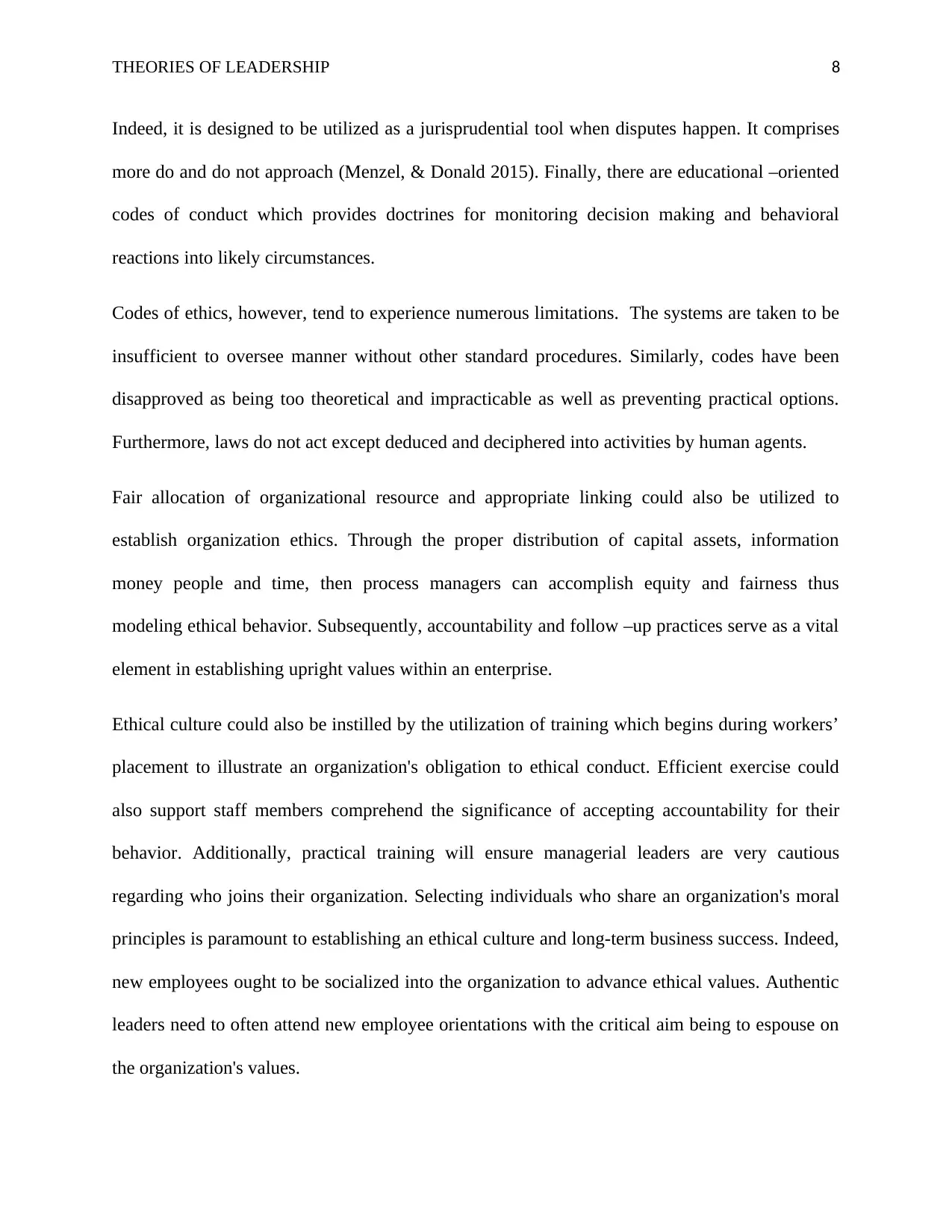
THEORIES OF LEADERSHIP 8
Indeed, it is designed to be utilized as a jurisprudential tool when disputes happen. It comprises
more do and do not approach (Menzel, & Donald 2015). Finally, there are educational –oriented
codes of conduct which provides doctrines for monitoring decision making and behavioral
reactions into likely circumstances.
Codes of ethics, however, tend to experience numerous limitations. The systems are taken to be
insufficient to oversee manner without other standard procedures. Similarly, codes have been
disapproved as being too theoretical and impracticable as well as preventing practical options.
Furthermore, laws do not act except deduced and deciphered into activities by human agents.
Fair allocation of organizational resource and appropriate linking could also be utilized to
establish organization ethics. Through the proper distribution of capital assets, information
money people and time, then process managers can accomplish equity and fairness thus
modeling ethical behavior. Subsequently, accountability and follow –up practices serve as a vital
element in establishing upright values within an enterprise.
Ethical culture could also be instilled by the utilization of training which begins during workers’
placement to illustrate an organization's obligation to ethical conduct. Efficient exercise could
also support staff members comprehend the significance of accepting accountability for their
behavior. Additionally, practical training will ensure managerial leaders are very cautious
regarding who joins their organization. Selecting individuals who share an organization's moral
principles is paramount to establishing an ethical culture and long-term business success. Indeed,
new employees ought to be socialized into the organization to advance ethical values. Authentic
leaders need to often attend new employee orientations with the critical aim being to espouse on
the organization's values.
Indeed, it is designed to be utilized as a jurisprudential tool when disputes happen. It comprises
more do and do not approach (Menzel, & Donald 2015). Finally, there are educational –oriented
codes of conduct which provides doctrines for monitoring decision making and behavioral
reactions into likely circumstances.
Codes of ethics, however, tend to experience numerous limitations. The systems are taken to be
insufficient to oversee manner without other standard procedures. Similarly, codes have been
disapproved as being too theoretical and impracticable as well as preventing practical options.
Furthermore, laws do not act except deduced and deciphered into activities by human agents.
Fair allocation of organizational resource and appropriate linking could also be utilized to
establish organization ethics. Through the proper distribution of capital assets, information
money people and time, then process managers can accomplish equity and fairness thus
modeling ethical behavior. Subsequently, accountability and follow –up practices serve as a vital
element in establishing upright values within an enterprise.
Ethical culture could also be instilled by the utilization of training which begins during workers’
placement to illustrate an organization's obligation to ethical conduct. Efficient exercise could
also support staff members comprehend the significance of accepting accountability for their
behavior. Additionally, practical training will ensure managerial leaders are very cautious
regarding who joins their organization. Selecting individuals who share an organization's moral
principles is paramount to establishing an ethical culture and long-term business success. Indeed,
new employees ought to be socialized into the organization to advance ethical values. Authentic
leaders need to often attend new employee orientations with the critical aim being to espouse on
the organization's values.
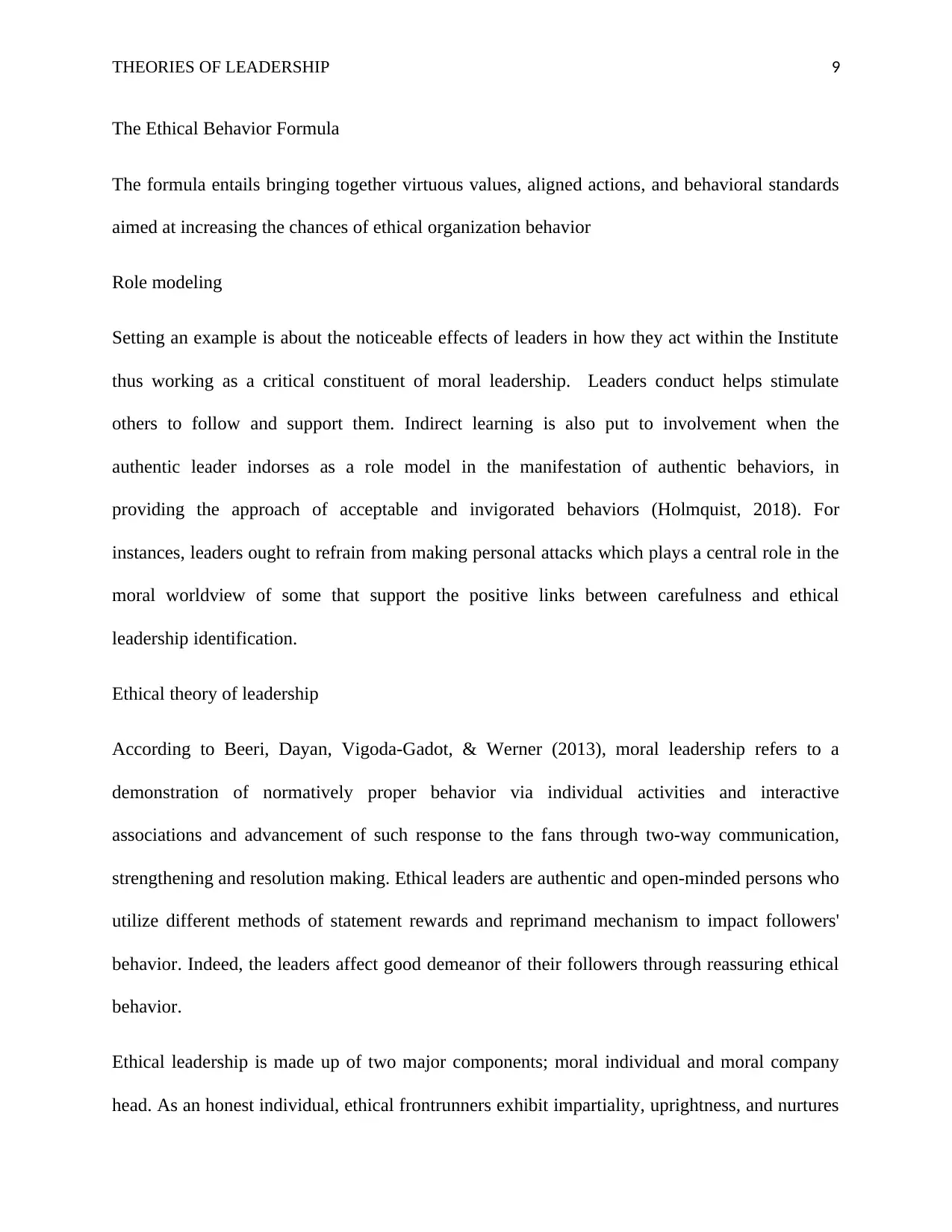
THEORIES OF LEADERSHIP 9
The Ethical Behavior Formula
The formula entails bringing together virtuous values, aligned actions, and behavioral standards
aimed at increasing the chances of ethical organization behavior
Role modeling
Setting an example is about the noticeable effects of leaders in how they act within the Institute
thus working as a critical constituent of moral leadership. Leaders conduct helps stimulate
others to follow and support them. Indirect learning is also put to involvement when the
authentic leader indorses as a role model in the manifestation of authentic behaviors, in
providing the approach of acceptable and invigorated behaviors (Holmquist, 2018). For
instances, leaders ought to refrain from making personal attacks which plays a central role in the
moral worldview of some that support the positive links between carefulness and ethical
leadership identification.
Ethical theory of leadership
According to Beeri, Dayan, Vigoda-Gadot, & Werner (2013), moral leadership refers to a
demonstration of normatively proper behavior via individual activities and interactive
associations and advancement of such response to the fans through two-way communication,
strengthening and resolution making. Ethical leaders are authentic and open-minded persons who
utilize different methods of statement rewards and reprimand mechanism to impact followers'
behavior. Indeed, the leaders affect good demeanor of their followers through reassuring ethical
behavior.
Ethical leadership is made up of two major components; moral individual and moral company
head. As an honest individual, ethical frontrunners exhibit impartiality, uprightness, and nurtures
The Ethical Behavior Formula
The formula entails bringing together virtuous values, aligned actions, and behavioral standards
aimed at increasing the chances of ethical organization behavior
Role modeling
Setting an example is about the noticeable effects of leaders in how they act within the Institute
thus working as a critical constituent of moral leadership. Leaders conduct helps stimulate
others to follow and support them. Indirect learning is also put to involvement when the
authentic leader indorses as a role model in the manifestation of authentic behaviors, in
providing the approach of acceptable and invigorated behaviors (Holmquist, 2018). For
instances, leaders ought to refrain from making personal attacks which plays a central role in the
moral worldview of some that support the positive links between carefulness and ethical
leadership identification.
Ethical theory of leadership
According to Beeri, Dayan, Vigoda-Gadot, & Werner (2013), moral leadership refers to a
demonstration of normatively proper behavior via individual activities and interactive
associations and advancement of such response to the fans through two-way communication,
strengthening and resolution making. Ethical leaders are authentic and open-minded persons who
utilize different methods of statement rewards and reprimand mechanism to impact followers'
behavior. Indeed, the leaders affect good demeanor of their followers through reassuring ethical
behavior.
Ethical leadership is made up of two major components; moral individual and moral company
head. As an honest individual, ethical frontrunners exhibit impartiality, uprightness, and nurtures
⊘ This is a preview!⊘
Do you want full access?
Subscribe today to unlock all pages.

Trusted by 1+ million students worldwide
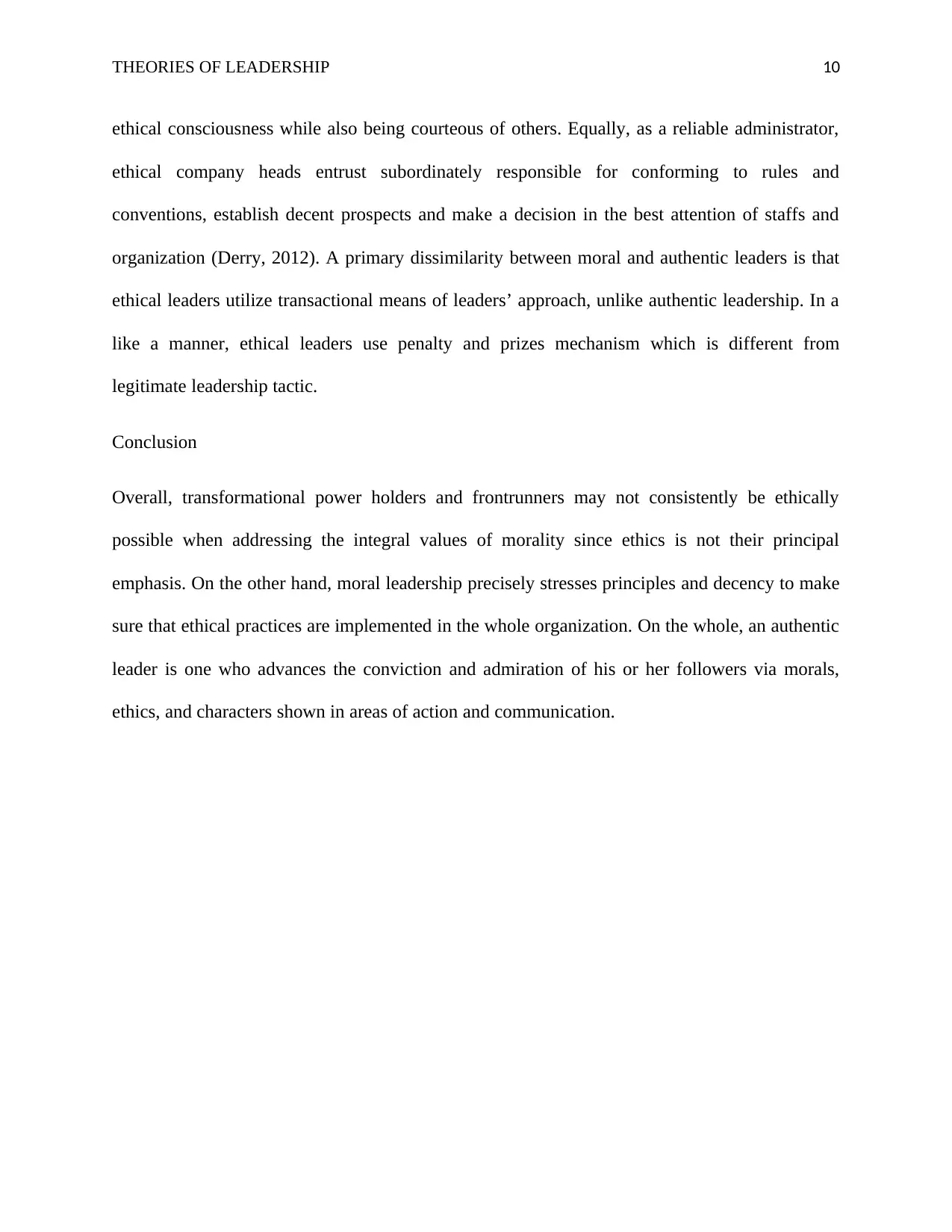
THEORIES OF LEADERSHIP 10
ethical consciousness while also being courteous of others. Equally, as a reliable administrator,
ethical company heads entrust subordinately responsible for conforming to rules and
conventions, establish decent prospects and make a decision in the best attention of staffs and
organization (Derry, 2012). A primary dissimilarity between moral and authentic leaders is that
ethical leaders utilize transactional means of leaders’ approach, unlike authentic leadership. In a
like a manner, ethical leaders use penalty and prizes mechanism which is different from
legitimate leadership tactic.
Conclusion
Overall, transformational power holders and frontrunners may not consistently be ethically
possible when addressing the integral values of morality since ethics is not their principal
emphasis. On the other hand, moral leadership precisely stresses principles and decency to make
sure that ethical practices are implemented in the whole organization. On the whole, an authentic
leader is one who advances the conviction and admiration of his or her followers via morals,
ethics, and characters shown in areas of action and communication.
ethical consciousness while also being courteous of others. Equally, as a reliable administrator,
ethical company heads entrust subordinately responsible for conforming to rules and
conventions, establish decent prospects and make a decision in the best attention of staffs and
organization (Derry, 2012). A primary dissimilarity between moral and authentic leaders is that
ethical leaders utilize transactional means of leaders’ approach, unlike authentic leadership. In a
like a manner, ethical leaders use penalty and prizes mechanism which is different from
legitimate leadership tactic.
Conclusion
Overall, transformational power holders and frontrunners may not consistently be ethically
possible when addressing the integral values of morality since ethics is not their principal
emphasis. On the other hand, moral leadership precisely stresses principles and decency to make
sure that ethical practices are implemented in the whole organization. On the whole, an authentic
leader is one who advances the conviction and admiration of his or her followers via morals,
ethics, and characters shown in areas of action and communication.
Paraphrase This Document
Need a fresh take? Get an instant paraphrase of this document with our AI Paraphraser
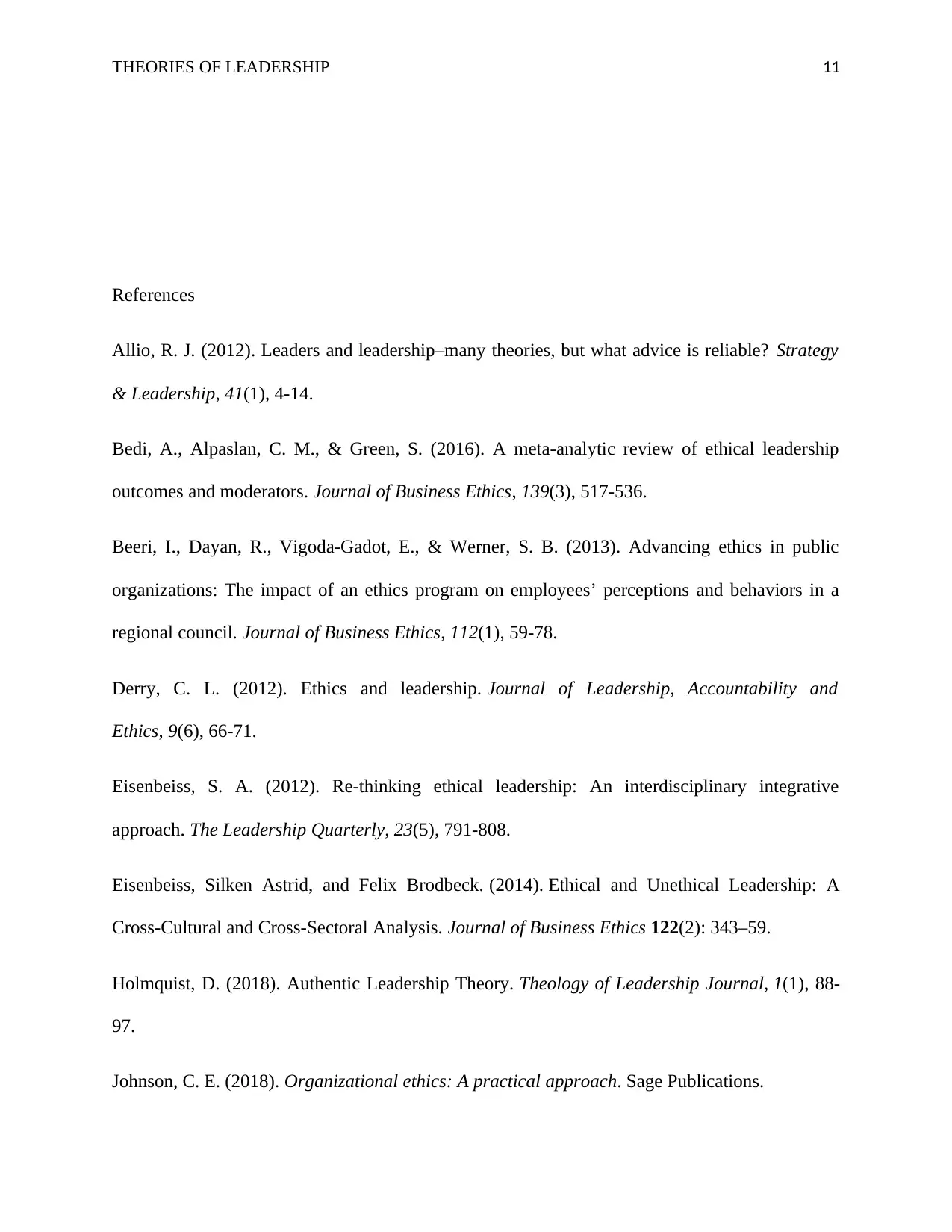
THEORIES OF LEADERSHIP 11
References
Allio, R. J. (2012). Leaders and leadership–many theories, but what advice is reliable? Strategy
& Leadership, 41(1), 4-14.
Bedi, A., Alpaslan, C. M., & Green, S. (2016). A meta-analytic review of ethical leadership
outcomes and moderators. Journal of Business Ethics, 139(3), 517-536.
Beeri, I., Dayan, R., Vigoda-Gadot, E., & Werner, S. B. (2013). Advancing ethics in public
organizations: The impact of an ethics program on employees’ perceptions and behaviors in a
regional council. Journal of Business Ethics, 112(1), 59-78.
Derry, C. L. (2012). Ethics and leadership. Journal of Leadership, Accountability and
Ethics, 9(6), 66-71.
Eisenbeiss, S. A. (2012). Re-thinking ethical leadership: An interdisciplinary integrative
approach. The Leadership Quarterly, 23(5), 791-808.
Eisenbeiss, Silken Astrid, and Felix Brodbeck. (2014). Ethical and Unethical Leadership: A
Cross‐Cultural and Cross‐Sectoral Analysis. Journal of Business Ethics 122(2): 343–59.
Holmquist, D. (2018). Authentic Leadership Theory. Theology of Leadership Journal, 1(1), 88-
97.
Johnson, C. E. (2018). Organizational ethics: A practical approach. Sage Publications.
References
Allio, R. J. (2012). Leaders and leadership–many theories, but what advice is reliable? Strategy
& Leadership, 41(1), 4-14.
Bedi, A., Alpaslan, C. M., & Green, S. (2016). A meta-analytic review of ethical leadership
outcomes and moderators. Journal of Business Ethics, 139(3), 517-536.
Beeri, I., Dayan, R., Vigoda-Gadot, E., & Werner, S. B. (2013). Advancing ethics in public
organizations: The impact of an ethics program on employees’ perceptions and behaviors in a
regional council. Journal of Business Ethics, 112(1), 59-78.
Derry, C. L. (2012). Ethics and leadership. Journal of Leadership, Accountability and
Ethics, 9(6), 66-71.
Eisenbeiss, S. A. (2012). Re-thinking ethical leadership: An interdisciplinary integrative
approach. The Leadership Quarterly, 23(5), 791-808.
Eisenbeiss, Silken Astrid, and Felix Brodbeck. (2014). Ethical and Unethical Leadership: A
Cross‐Cultural and Cross‐Sectoral Analysis. Journal of Business Ethics 122(2): 343–59.
Holmquist, D. (2018). Authentic Leadership Theory. Theology of Leadership Journal, 1(1), 88-
97.
Johnson, C. E. (2018). Organizational ethics: A practical approach. Sage Publications.
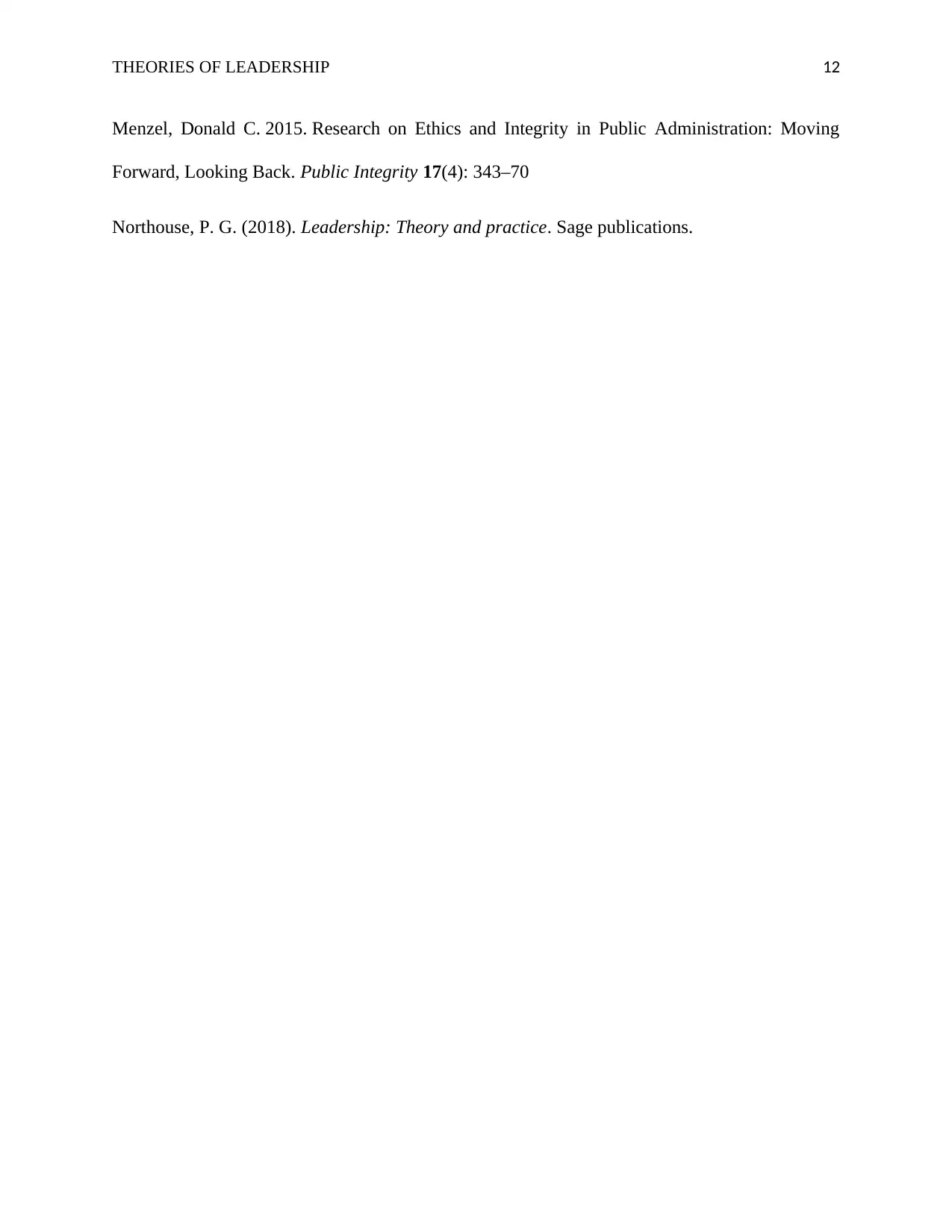
THEORIES OF LEADERSHIP 12
Menzel, Donald C. 2015. Research on Ethics and Integrity in Public Administration: Moving
Forward, Looking Back. Public Integrity 17(4): 343–70
Northouse, P. G. (2018). Leadership: Theory and practice. Sage publications.
Menzel, Donald C. 2015. Research on Ethics and Integrity in Public Administration: Moving
Forward, Looking Back. Public Integrity 17(4): 343–70
Northouse, P. G. (2018). Leadership: Theory and practice. Sage publications.
⊘ This is a preview!⊘
Do you want full access?
Subscribe today to unlock all pages.

Trusted by 1+ million students worldwide
1 out of 12
Related Documents
Your All-in-One AI-Powered Toolkit for Academic Success.
+13062052269
info@desklib.com
Available 24*7 on WhatsApp / Email
![[object Object]](/_next/static/media/star-bottom.7253800d.svg)
Unlock your academic potential
Copyright © 2020–2026 A2Z Services. All Rights Reserved. Developed and managed by ZUCOL.




